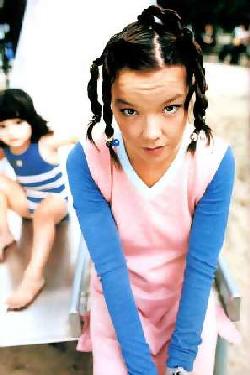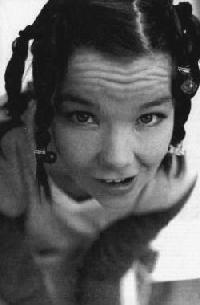Bust #8, Fall/Winter 96
Freaky MömmaInterview by Jennifer TilityPictures by ? |
|
The girl attended classical music school, recorded an album of Icelandic cover tunes in 1977 at the age of 12, and became a punk/goth infidel as a teenager. Her band, the Sugarcubes, introduced her to fame outside of Iceland. At 18, she fell in love. She got married, got pregnant, wore a cropped shirt over her swollen belly and sang "Like A Virgin" on Icelandic TV, reportedly provoking an old woman watching the tube to have a heart attack. She gave birth to a son, Sindri, at 20. The marriage broke up. The band broke up. As a single mum, she moved to London with her son, and was true to her nature - independent. She "Debut"ed successfully in '93; after that came "Post", a "Letter to Iceland". Which brings us to the present. Björk Gudmundsdottir, here, in New York, sitting with me on the fire escape, sneezing like crazy because she's allergic to the cat that's roaming around here. Jennifer: I read that a third of all births in Iceland are out of wedlock - but it doesn't seem to be stigmatized! Björk: It's different, because family is so important. For me to have a baby at 20 and then be single, there is no problem because I was brought up in a massive family. Everyone just takes care of everyone. I think one reason why divorce is so common in Iceland is marriage is not taken so seriously. You love a person; if you don't love that person anymore, you don't live with them because, why suffer? All my ex-lovers, I haven't got tons or anything, but they're all mates of mine. Jennifer: Are you concerned about raising Sindri in London where he'll get messages that are sort of macho or sexist? Björk: I think it's very important that he learns to judge for himself, you
know? I was lucky enough to grow up in a society that is not so racist or
sexist or all these things. Women in Iceland are quite independent. Women
and men are equal. Unfortunately, they still go to jobs that are low paid -
babysitting and all that - but we've got the most women in Parliament in the
world, the head of Parliament is a woman, the President used to be a woman.
The amount of women in high positions is the highest in the world. We've
had to fight our feminist fights and all that bollocks, but it's like
"mmm...so what?" It's no big deal.
You know, feminists really tire me, they really bore me to death.
Especially my generation. I can relate to it if you're talking about my
mother's age or my grandmother's age and they're still angry and upset. I
don't agree with everything she says - because we're human and we're
different - but I have to agree with Courtney Love when she says she can't
understand these feminists now. You've had a very aggressive feminist
movement for over 100 years! So for women to stand up and say Jennifer: Wait, do you feel like women say that? Because I don't feel like I hear that so much... Björk: Ffffttt. Oh, God, the arguments I get into at parties. Jennifer: Really? Björk: Oh, yeah! They're so bitter! The thing is, the cage has been opened and what you've got to do, a woman today, is walk out of it. I find with problems - you've got all sorts of different brands of problems - [sexism] is the kind where the more you talk about it, the bigger it gets, you see. Maybe, say, in America 50 years ago, it was necessary to talk and get the tumor and cut it open with a knife and get all dirty and ugly about it. Say for example being a single parent. A hundred years ago being a single parent in the States, you couldn't financially- Jennifer: And you would have been vilified- Björk: Yeah, and all this morality blahblahblah. But today, there are no
problems like that.
Jennifer: Well... Björk: Well, there are. But you can make anything into a problem. If you're going to say, "Oh, I've got a baby, it's going to be so difficult", it is. If you work on it, you'll be fine. And I'm not saying this in an arrogant way - "Oh, that's alright of you to say because you've got money"- because I've only had money for, say, three years. I was a working class, hard-working, single mother until then. Jennifer: Did you feel like you were ready to have a baby when you had Sindri? Björk: I was too young to even think about it. It just kinda happened and I would do it completely differently now. Not that I did it wrong or right, but I was 20 and I was like "Oh, another person. Woohoo!" Jennifer: What was the birth like? Björk: I remember very stupid things like the nurse kept giving me fruit juices instead of water and that really pissed me off. On the whole, it was probably one of my favorite experiences. Jennifer: How has being a mother changed your creativity or your art? Björk: It hasn't changed it at all, really. I can't really imagine it without it. You know it's like saying, "If you had six toes, would you write different songs?" Jennifer: Do you ever write specifically about motherhood or as if you were writing to Sindri? Björk: No. I think motherhood is far more complex than that. Because if you get close to people, you keep swapping roles. You mother a person, and you mother yourself and you father yourself. You allow yourself to be an idiot and you do the same with your friends. And to say I'm only protective towards my child, and when I meet my mother I'm really stupid, when I meet my boyfriend I'm really sexy, and when I meet my friends I'm really humorous - I think life is a bit more complex than that and you end up being everything at once. And that's kind of what I like about life - that you can't analyze it like that. You can't stand in front of your kid and say, "I'm your mother and you're my child". It's just not that simple, because you've got a friend for life in your child. And sometimes, the kids, they protect you. I just find it quite funny that when you love someone - whether it's a child or a boyfriend or whatever it is, a friend - it becomes so precious that you hide your ugly sides. Which I think is very funny because when my friends show their ugly sides to me, I'm almost honored. That means you're very intimate with the person. Jennifer: Do you think you're like your mother? Björk: In some ways. I think I've got much more of my father in me. Both in the way I look but also my characteristics. Jennifer: I've read in other interviews that you characterize your father as being very conservative and your mother as being a hippie. Björk: That was probably more the two families than exactly them. They divorced when I was 1 and my dad started a quite conservative family and a home that was full of people because he had another wife and, like, three kids. And my mom just invited all these friends to live with her so I kept being the hippie amongst the conservatives or the conservative amongst the hippies. And I quite liked that, I was kinda the outsider always going "Hmmm, but why can't we have one meal a day please?" and "Why does everything have to be purple?" Jennifer: You're still sort of an outsider - Icelandic culture is seen as so strange... Björk: I quite like that, you know? It seems to be my lot in life. I was at classical school and my grandparents only listened to jazz and I loved to go to my grandparents' house and play them Jimi Hendrix. Or go to the hippies and play them Simon and Garfunkel, which was pretty conservative to them. And then at school, doing the same thing. I could never belong to just one group. I would hang out with the disco fever people and play them punk tunes, hang out with the arty-farties and kind of be the normal person, and hang out with all the boys who did chemistry experiments and had insect collections and kinda be the- I don't know how to explain it- Jennifer: Be the ambassador of all these different micro-cultures? Björk: Yeah. I think I'm a much better Icelander abroad than I am in Iceland.
In Iceland, everyone thinks I'm really foreign and eccentric and really
strange and they don't understand me and my music sounds very awkward and
foreign. And then I go abroad and they say, "Oh, you are so strange and
awkward. That must be because you are from Iceland." I quite like that,
you see. And then all the people I work with - say one minute I'm working
with a string quartet and the next minute I'm working with techno people and
the next minute I'm working with the saxophone quartet and the next minute
I'm working with a flute player - I always liked being the one being like
"OK that's cool, but have you thought about this?", and almost kind of
gently say, "Listen, don't take this for granted. There's more to this."
And not because I'm destructive but just to kind of keep things alert.
Alive.
Jennifer: How would you feel if your son was gay? Björk: That was actually the first thing his father said when he saw him. Thor said, "It's a boy and he's gay." That's just his sense of humor. I laughed my head off and the doctors couldn't believe how insensitive he was. But that was exactly what I needed, just to have a laugh after all of that hard work. In a sense it would be quite handy because I wouldn't mind, instead of having a gay person being born into a family where they would make it into a nightmare for him. But you can't think that way - my son just has to be my son, doesn't he? I wouldn't mind at all, though. When we talk about boyfriends or girlfriends, we always talk about both possibilities.
Jennifer: For you? Björk: For him. Or for whomever. 'Cause I've got a lot of gay friends and lesbian friends and they bring their lovers around and it's not taken for granted that it's the other sex. That's something that I think is sort of wonderful about this generation - I feel like my kids will grow up thinking that being gay is just normal, as opposed to being a tragedy. Jennifer: What do you see as your mission as an artist? Björk: I guess to smitten people. Meaning a lot of things, it depends on what day it is and what situation I'm in. I sing about emotion and sometimes, it's sympathetic, sometimes it's to remind people of being alive. I'm not saying necessarily that I succeed all of the time but that's my target, you see, that's why I'm still doing this job after all of these years. Jennifer: How do you know when you're laying down a track then, whether you've done that? Björk: You can just feel it. I think people should not confuse it with something like "godly" or "otherworldly" or "supernatural" or "Ghostbusters" or "diva" or "power" - especially not power. It's the opposite. It's a very humble energy. It's kind of hard to describe without sounding really fake. It's just like when you meet someone the first time and you just know you're going to be great friends. It's like, how did you know that you fell in love or not? You just know. Jennifer: Do you feel that music, or other kinds of art, has an obligation to innovate? Björk: What I don't like about the word "art" is the fact that certain people are artists and certain people are not. The minute you think that this energy - like what you say, "innovative" - belongs to certain people and not to others, you've got it all wrong. Then you've got some sort of VIP or hierarchy of that energy. That energy belongs to everyone. You can be creative just by driving a taxi but you have a great sense of humor - I consider that very creative. I admire different people that can be in that kind of situation and still just come up with something that never existed before. At the end of the day, that's what creativity is about, coming up with something that never existed before. Jennifer: Do you feel like there have been innovations in pop music in the past 20 years? Has there been a lot going on? Björk: I'm just trying to draw the attention away from the pop music thing and show that it's the same struggles that everyone is dealing with. So at the end of the day, you're born with ten fingers, two eyes, and a mouth and an imagination and you get like 50 or 60 years out of life. It's your duty to use what you've got and not just put yourself to sleep or function like a robot. It doesn't matter what job you do, to wake up in the morning and actually find that day exciting is the biggest victory you can do. And then, say, to do a song like that, which is my job, sing them and go [intake hiss of breath] just before I go onstage, I'm like, "Woohoo!" It's just an appetite for life and enthusiasm; life wins death - one-nil. And I'm always trying not to be philosophical or deep but, for me, it's everywhere. It's not just in pop music. Jennifer: I was wondering if you could describe your life in terms of a fairie tale? Björk: Well, I think it is a fairie tale. I find it very tiring when people
think magic is like in David Copperfield or like the Ghostbusters. No, I
totally, just to set the record straight, I believe, I'm very much into
magic and fairies. Yeah. I'm probably the biggest fan of magic realism
there is. You know, Lorca, Frida Kahlo. The sagas of Iceland are similar
to that: down-to-earth, common-sense, bread-and-butter. It is real. And I
don't believe in escapism, fantasy, I believe in the magic that is just
there. But I can't, say, write out my life because that would kill it. I
don't want to know what happens next, you know? That's very important to
me.
|


